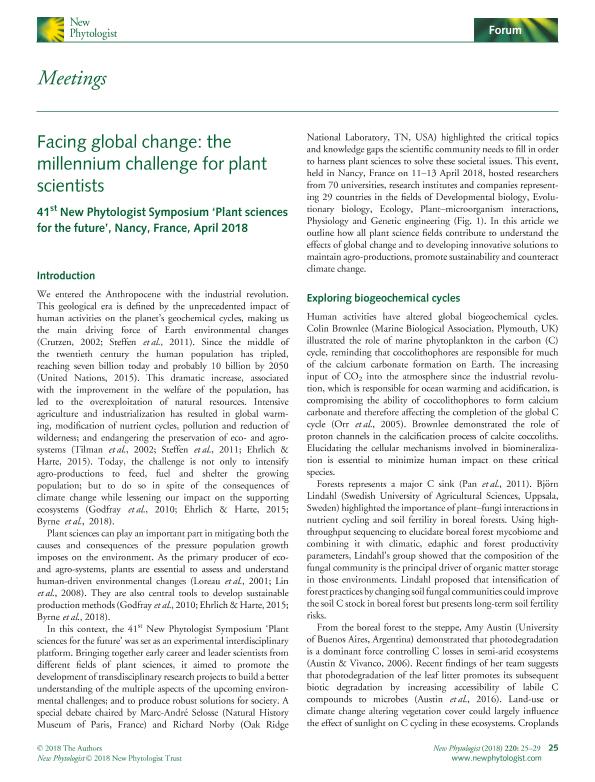Artículo
Facing global change: the millennium challenge for plant scientists
Basso, Veronica; De Freitas Pereira, Maíra; Maillard, François; Mallerman, Julieta ; Mangeot Peter, Lauralie; Zhang, Feng; Bonnot, Clémence
; Mangeot Peter, Lauralie; Zhang, Feng; Bonnot, Clémence
 ; Mangeot Peter, Lauralie; Zhang, Feng; Bonnot, Clémence
; Mangeot Peter, Lauralie; Zhang, Feng; Bonnot, Clémence
Fecha de publicación:
10/2018
Editorial:
Wiley Blackwell Publishing, Inc
Revista:
New Phytologist
ISSN:
0028-646X
Idioma:
Inglés
Tipo de recurso:
Artículo publicado
Clasificación temática:
Resumen
We entered the Anthropocene with the industrial revolution. This geological era is defined by the unprecedented impact of human activities on the planet's geochemical cycles, making us the main driving force of Earth environmental changes (Crutzen, 2002; Steffen et al., 2011). Since the middle of the twentieth century the human population has tripled, reaching seven billion today and probably 10 billion by 2050 (United Nations, 2015). This dramatic increase, associated with the improvement in the welfare of the population, has led to the overexploitation of natural resources. Intensive agriculture and industrialization has resulted in global warming, modification of nutrient cycles, pollution and reduction of wilderness; and endangering the preservation of eco‐ and agro‐systems (Tilman et al., 2002; Steffen et al., 2011; Ehrlich & Harte, 2015). Today, the challenge is not only to intensify agro‐productions to feed, fuel and shelter the growing population; but to do so in spite of the consequences of climate change while lessening our impact on the supporting ecosystems (Godfray et al., 2010; Ehrlich & Harte, 2015; Byrne et al., 2018). Plant sciences can play an important part in mitigating both the causes and consequences of the pressure population growth imposes on the environment. As the primary producer of eco‐ and agro‐systems, plants are essential to assess and understand human‐driven environmental changes (Loreau et al., 2001; Lin et al., 2008). They are also central tools to develop sustainable production methods (Godfray et al., 2010; Ehrlich & Harte, 2015; Byrne et al., 2018). In this context, the 41st New Phytologist Symposium ‘Plant sciences for the future’ was set as an experimental interdisciplinary platform. Bringing together early career and leader scientists from different fields of plant sciences, it aimed to promote the development of transdisciplinary research projects to build a better understanding of the multiple aspects of the upcoming environmental challenges; and to produce robust solutions for society. A special debate chaired by Marc‐André Selosse (Natural History Museum of Paris, France) and Richard Norby (Oak Ridge National Laboratory, TN, USA) highlighted the critical topics and knowledge gaps the scientific community needs to fill in order to harness plant sciences to solve these societal issues. This event, held in Nancy, France on 11–13 April 2018, hosted researchers from 70 universities, research institutes and companies representing 29 countries in the fields of Developmental biology, Evolutionary biology, Ecology, Plant–microorganism interactions, Physiology and Genetic engineering (Fig. 1). In this article we outline how all plant science fields contribute to understand the effects of global change and to developing innovative solutions to maintain agro‐productions, promote sustainability and counteract climate change.
Archivos asociados
Licencia
Identificadores
Colecciones
Articulos(IFEVA)
Articulos de INST.D/INV.FISIOLOGICAS Y ECO.VINCULADAS A L/AGRIC
Articulos de INST.D/INV.FISIOLOGICAS Y ECO.VINCULADAS A L/AGRIC
Citación
Basso, Veronica; De Freitas Pereira, Maíra; Maillard, François; Mallerman, Julieta; Mangeot Peter, Lauralie; et al.; Facing global change: the millennium challenge for plant scientists; Wiley Blackwell Publishing, Inc; New Phytologist; 220; 1; 10-2018; 25-29
Compartir
Altmétricas



